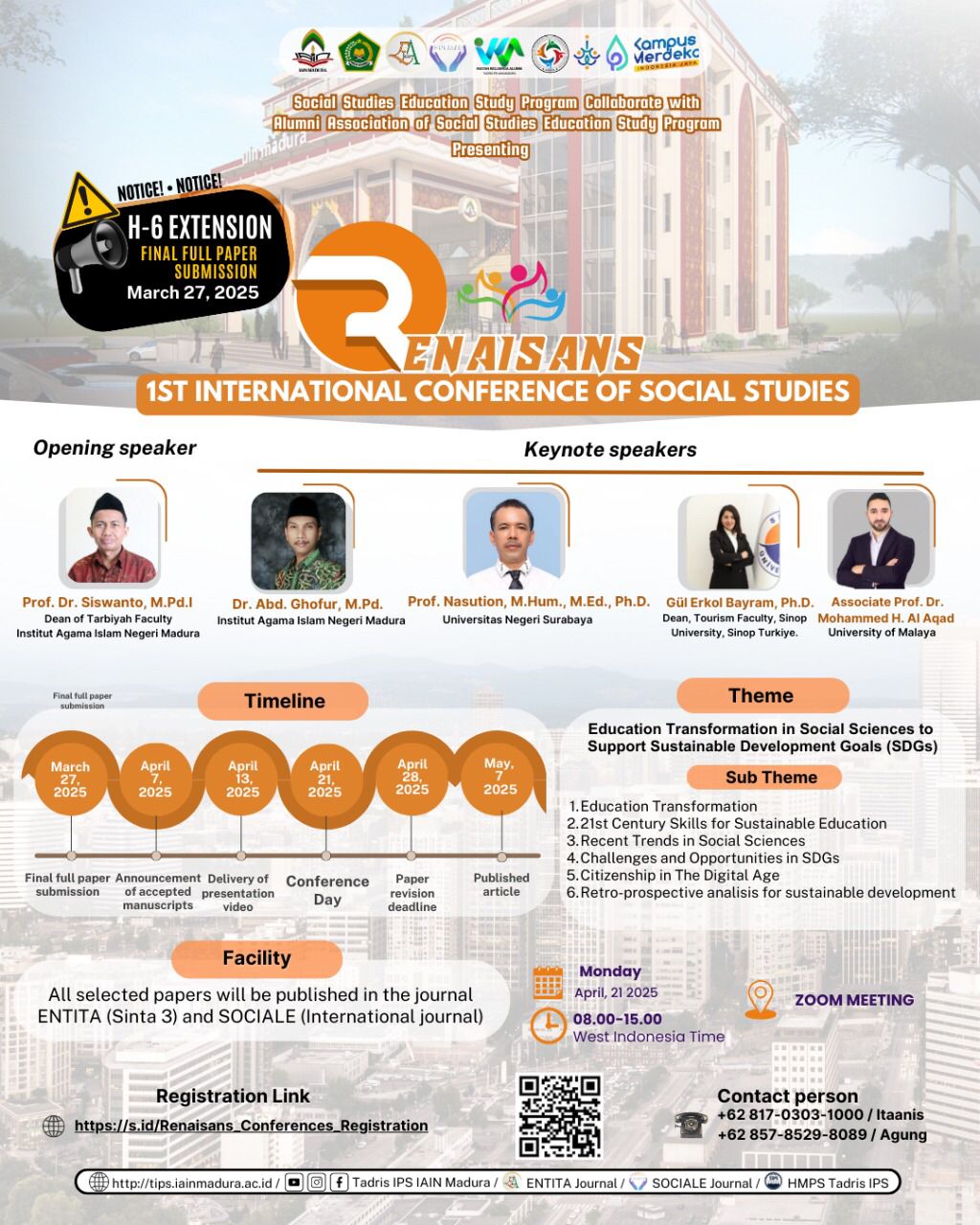Analisis Integrasi TIK Berbasis Platform Digital pada Pembelajaran untuk Meningkatkan Kesadaran Kewarganegaraan sebagai Upaya Mendukung SDGs
 Abstract views: 4
,
Abstract views: 4
,
 PDF (Bahasa Indonesia) downloads: 3
PDF (Bahasa Indonesia) downloads: 3
Abstract
One of the programs in the Merdeka curriculum focuses on strengthening the outcomes of the Pancasila Student Profile, developed in accordance with themes set by the government. This character development effort can be achieved through the application of the "Pancasila Student Profile," which aligns with the characteristics of the Merdeka learning curriculum. Given the rapid advancement of information and communication technology (ICT), integrating ICT into education becomes essential to ensure that Pancasila education remains effective and competitive in an ever-changing global era.The research method used in this study is a qualitative approach with a case study design. The research site is Madrasah Aliyah Asy-Syakur Bojonegoro, and the subjects are teachers and students. Data collection occurs in several stages, including in-depth interviews, classroom observations, and document analysis. The validity of the research findings is strengthened through data triangulation. Based on the research results, teachers perceive the main benefit of using digital platforms as an increase in student interest in Pancasila education. Meanwhile, students become more enthusiastic about understanding their rights and obligations as citizens and participating in social activities. The use of digital media in teaching has also been beneficial for students. Students involved in social projects related to community importance through digital platforms are more motivated and engaged in learning. This is because digital technology helps students understand the significance of their education and daily lives.
Downloads
References
Akbar, A. (2019). TANTANGAN DAN SOLUSI DALAM PERKEMBANGAN TEKNOLOGI PENDIDIKAN DI INDONESIA.
Almarisi, A. (2023). Kelebihan dan Kekurangan Kurikulum Merdeka pada Pembelajaran Sejarah dalam Perspektif Historis. MUKADIMAH: Jurnal Pendidikan, Sejarah, Dan Ilmu-Ilmu Sosial, 7(1), 111–117. https://doi.org/10.30743/mkd.v7i1.6291
Alrakhman, R. (2022). PEMBELAJARAN JARAK JAUH PENDIDIKAN KEWARGANEGARAAN: TANTANGAN DALAM PENERAPAN MERDEKA BELAJAR DI ERA DISRUPSI. 14(1).
Amalia, M., & Tirtayasa, U. S. A. (2022). Inovasi pembelajaran kurikulum merdeka belajar Di Era Society 5.0 untuk Revolusi Industri 4.0. 1(1), 1–6.
Creswell, J. W., & Creswell, J. D. (2018). Research Design: Qualitative, Quantitative, and Mixed Methods Approaches.
Julianto, I. R. (2023). POTENSI APLIKASI TIKTOK SEBAGAI MEDIA PEMBELAJARAN BERINTEGRASI PROFIL PELAJAR PANCASILA PADA MATA PELAJARAN BAHASA INDONESIA. Jurnal Metamorfosa, 11(1), 71–82. https://doi.org/10.46244/metamorfosa.v11i1.2065
Nadita Fajarini, Habibah Amumpuni, Nur Ani Parida, & Meilisa Sajdah. (2024). Pengaruh Penggunaan TikTok sebagai Media Pembelajaran Pendidikan Agama Islam Pada Era 4.0. Jurnal Bintang Pendidikan Indonesia, 2(2), 163–172. https://doi.org/10.55606/jubpi.v2i2.2959
Panggabean, A. N. (2021). MEMAHAMI DAN MENGELOLA TRANSFORMASI DIGITAL. Open Science Framework. https://doi.org/10.31219/osf.io/s36wq
Ramdani, N. S., Nugraha, H., & Hadiapurwa, A. (2021a). POTENSI PEMANFAATAN MEDIA SOSIAL TIKTOK SEBAGAI MEDIA PEMBELAJARAN DALAM PEMBELAJARAN DARING. Akademika, 10(02), 425–436. https://doi.org/10.34005/akademika.v10i02.1406
Ramdani, N. S., Nugraha, H., & Hadiapurwa, A. (2021b). POTENSI PEMANFAATAN MEDIA SOSIAL TIKTOK SEBAGAI MEDIA PEMBELAJARAN DALAM PEMBELAJARAN DARING. Akademika, 10(02), 425–436. https://doi.org/10.34005/akademika.v10i02.1406
Roza, W., Yesi Guspita Sari, Bera Eka Putra, & Desi Armi Eka Putri. (2023). PEMANFAATAN TEKNOLOGI INFORMASI DAN KOMUNIKASI (TIK) SEBAGAI MEDIA PEMBELAJARAN DI DUNIA PENDIDIKAN. Jurnal Binagogik, 10(2), 89–98. https://doi.org/10.61290/pgsd.v10i2.426
Rusnaini, R., Raharjo, R., Suryaningsih, A., & Noventari, W. (2021). Intensifikasi Profil Pelajar Pancasila dan Implikasinya Terhadap Ketahanan Pribadi Siswa. Jurnal Ketahanan Nasional, 27(2), 230. https://doi.org/10.22146/jkn.67613
Suharsimi Arikunto. (1992). Prosedur penelitian: Suatu pendekatan praktik. Rineka Cipta.
Susilawati, E., Sarifudin, S., & Muslim, S. (2021). INTERNALISASI NILAI PANCASILA DALAM PEMBELAJARAN MELALUI PENERAPAN PROFIL PELAJAR PANCASILA BERBANTUAN PLATFORM MERDEKA MENGAJAR. Jurnal Teknodik, 155–167. https://doi.org/10.32550/teknodik.v25i2.897
Susilawati, W. O. (2021). PENGEMBANGAN E-MODUL PEMBELAJARAN PERKEMBANGAN SOSIAL AUD BERBASIS KARAKTER MENGGUNAKAN SOFTWARE FLIPBOOK MAKER. Inspiratif Pendidikan, 10(2), 1. https://doi.org/10.24252/ip.v10i2.23519
Susilawati, W. O., Veriyani, F. T. V., Pratiwi, Y., Sari, T. A. N., & Riani, S. (2022). Pengembangan buku ajar digital PPKn SD terintegrasi profil pelajar Pancasila dalam mendukung kurikulum merdeka. Jurnal Pendidikan, Sains Sosial, Dan Agama, 8(1), 187–201. https://doi.org/10.53565/pssa.v8i1.452
Syamsuddin A. R., & Damianti, V. S. (2006). Metode penelitian pendidikan bahasa. Diterbitkan atas kerjasama Program Pascasarjana Universitas Pendidikan Indonesia dengan Remaja Rosdakarya.
Tasaik, H. L., & Tuasikal, P. (2018). PERAN GURU DALAM MENINGKATKAN KEMANDIRIAN BELAJAR PESERTA DIDIK KELAS V SD INPRES SAMBERPASI. Metodik Didaktik, 14(1). https://doi.org/10.17509/md.v14i1.11384
Yamin, M., & Syahrir, S. (2020). PEMBANGUNAN PENDIDIKAN MERDEKA BELAJAR (TELAAH METODE PEMBELAJARAN). Jurnal Ilmiah Mandala Education, 6(1). https://doi.org/10.58258/jime.v6i1.1121
Copyright (c) 2025 Entita: Jurnal Pendidikan Ilmu Pengetahuan Sosial dan Ilmu-Ilmu Sosial

This work is licensed under a Creative Commons Attribution-NonCommercial 4.0 International License.
ENTITA: Jurnal Pendidikan Ilmu Pengetahuan Sosial dan Ilmu-Ilmu Sosial operates an Open Access policy under a Creative Commons Non-Commercial 4.0 International license. Authors who publish with this journal agree to the following terms:
- The copyright of the received article once accepted for publication shall be assigned to the journal as the publisher with licensed under a

- Journal is able to enter into separate, additional contractual arrangements for the non-exclusive distribution of the journal's published version of the work (e.g., post it to an institutional repository or publish it in a book), with an acknowledgement of its initial publication in this journal.
- Journal is permitted and encouraged to post their work online (e.g., in institutional repositories or on their website) prior to and during the submission process, as it can lead to productive exchanges, as well as earlier and greater citation of published work (see The Effect of Open Access).
- Here is Copyright Transfer Form that author can download and send to OJS during submission.

















